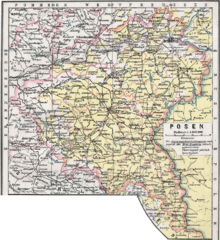Wielichowo
| Wielichowo | ||
|---|---|---|

|
|
|
| Basic data | ||
| State : | Poland | |
| Voivodeship : | Greater Poland | |
| Powiat : | Grodziski | |
| Area : | 1.24 km² | |
| Geographic location : | 52 ° 7 ' N , 16 ° 21' E | |
| Residents : | 1755 (June 30, 2019) |
|
| Postal code : | 64-050 | |
| Telephone code : | (+48) 61 | |
| License plate : | PGO | |
| Gmina | ||
| Gminatype: | Urban and rural municipality | |
| Gmina structure: | 19 localities | |
| 15 school offices | ||
| Surface: | 107.43 km² | |
| Residents: | 6901 (June 30, 2019) |
|
| Population density : | 64 inhabitants / km² | |
| Community number ( GUS ): | 3005053 | |
| Administration (as of 2006) | ||
| Community leader : | Adam Łaniecki | |
| Address: | Rynek 10 64-050 Wielichowo |
|
| Website : | www.wielichowo.pl | |
Wielichowo ( German : Wielichowo ; 1943-1945 Wiesenstadt ) is a town and seat of the urban and rural municipality of the same name in Poland . The place is located in the powiat Grodziski of the Greater Poland Voivodeship .
Geographical location
Wielichowo is located north of the Obra-Bruch on the Obra Canal , about fifty kilometers as the crow flies southwest of the city of Posen and ten kilometers south-southwest of the city of Grätz ( Grodzisk Wielkopolski ).
history

The village used to belong to the table goods of the Bishop of Poznan and was therefore exempt from certain burdens, taxes to which the Polish king would otherwise have been entitled. The bishop who first promoted the village is said to have given it the name Czotkowice , but this did not prevail. Bishop Stanisław I from the house of Ciolek z Zelichowa i Ostroleki (1428–1437) obtained Magdeburg law for them when they were raised to town in 1429 by King Władysław II , as had already been given to the cities of Posen and Kościan ( costs ). The king authorized the city to hold a fair and a weekly market every Tuesday. However, there was no rapid economic rise, especially since Jews were unable to gain a foothold in an episcopal city. The city had a suburbium , which included 21 Hufen .
At the. January 14, 1797, King Friedrich Wilhelm II gave the city to Beyer's Secret Cabinet Councilor . In the 19th century the city came into the private property of the Prussian major general Friedrich Wilhelm Christian von Zastrow , then to Count Michael Mielzynski . In 1840 it had 122 houses.
In Prussian times, the city had belonged to the district of Kosten since 1815 and to the district of Schmiegel from 1897 to 1918 . After the First World War , Wielichowo had to be ceded to the Second Polish Republic due to the provisions of the Versailles Treaty .
In 1939 the region was occupied by the Wehrmacht. Towards the end of the Second World War , the city was captured by the Red Army in the spring of 1945 .
Population numbers
- 1816: 538
- 1837: 962
- 1843: 1.118
- 1861: 1,444
- 1885: 1,720, including 145 Evangelicals and 32 Jews
local community
In addition to the city of Wielichowo, another 15 districts ( German names until 1945 ) with a Schulzenamt belong to the city and rural community of Wielichowo :
|
|
|
Other localities in the municipality are Borek, Helenopol, Mokrzec and Pawłówko.
Personalities
- Friedrich Wilhelm Christian von Zastrow (1752–1830), Prussian infantry general, was the owner of the city of Wielichowo.
literature
- Heinrich Wuttke : City book of the country Posen. Codex diplomaticus: General history of the cities in the region of Poznan. Historical news from 149 individual cities . Leipzig 1864, p. 465.
Individual evidence
- ↑ a b population. Size and Structure by Territorial Division. As of June 30, 2019. Główny Urząd Statystyczny (GUS) (PDF files; 0.99 MiB), accessed December 24, 2019 .
- ↑ Order about change of place names in Reichsgau Wartheland in the ordinance sheet of the Reich governor in Warthegau from May 18, 1943 (pdf; 1.8 MB)
- ↑ a b c d e f Wuttke (1864), p. 465.
- ^ Michael Rademacher: German administrative history from the unification of the empire in 1871 to the reunification in 1990. pos_schmiegel.html. (Online material for the dissertation, Osnabrück 2006).
- ↑ The Genealogical Place Directory

